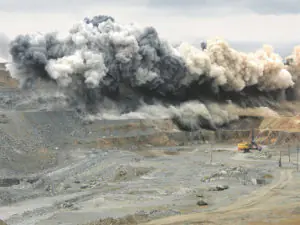Is nitrogen dangerous for humans or nitrogen poisoning - this is only a myth, because up to 80% of this substance is in the atmospheric air and people inhale it mixed with other gases. When it enters the lungs with air masses, it does not have any effect on the human condition. But with increasing concentration in the body, poisoning occurs, the consequences of which are dangerous and not always predictable.
The content of the articleThe effect of nitrogen on the body
The substance is an inert gas that is odorless, tasteless and colorless. Its content in the body is close to 2.5%. Thanks to nitrogen, cells and tissues are built, energy metabolism occurs, since it is part of the amino acids from which proteins are built. And since a person is a protein structure, the role of nitrogen cannot be underestimated.
The element in the form of compounds is part of some hormones (insulin, thyroxine, adrenaline), mediators, due to which contact between nerve cells occurs (acetylcholine). Nitrogen dioxide and its derivatives (nitroglycerin) affect smooth muscle, dilating and constricting blood vessels.
Atmospheric nitrogen is not able to be absorbed by the body; it can only be obtained from food containing nitrogenous compounds (peptides, amino acids, purines). Nitrogen poisoning occurs when excess amounts of the substance are ingested through foods containing nitrates or through the air (inhalation of vapors).
Note: Obtaining a high dose of nitrogen is most often possible in production, since gas is widely used in industry. In everyday life, cases of poisoning are rare.Causes of nitrogen poisoning
Cases of nitrogen poisoning in production, where it is most often used in the form of oxides and solutions, are possible if safety precautions are violated. Sometimes, during an accident, mass poisoning occurs if we are talking about a large industrial facility. Vapors enter the respiratory tract during the following technical operations:
- when filling a container with a substance or during its transportation; If the product contains food additive E942, which contains nitrogenous compounds, it should be discarded as it is harmful to health.
Nitrogen enters the body through the esophagus when consuming vegetables and fruits grown on nitrogen fertilizers and characterized by a high concentration of nitrates. Internal combustion engines and transport gases are also sources of poisoning.
Nitrogen intoxication or drug-induced sleep occurs in divers at great depths. When tired, the effect of the substance increases, and a lack of oxygen and hypothermia are added to this. And the increased pressure of water masses fully exhibits the narcotic effect of the substance. In this case, nitrogen poisoning is a deep-seated disease of divers.
It is difficult to recognize an excess of a substance in the body, since it is classified as “invisible” without smell, color, or taste. Difficulties also arise with the maximum permissible dose, since the time of contact with the toxic compound is unknown.
Harm of nitrogen to the human body
The mechanism of nitrogen poisoning is not fully understood. It was found that it dissolves in fat cells and causes general intoxication, which continues until it is completely eliminated. Nitrogen “sticks” to the membranes of nerve cells, causing problems in the transmission of nerve impulses, which affects the human central nervous system and affects mental activity.
The picture of symptoms of nitrogen poisoning is as follows:
- memory loss and a state of fun;
- auditory and visual hallucinations;
- development of a prolonged cough with blood discharge;
- pain in the chest area;
- apathy and;
- subfebrile increase in body temperature;
- bluish tint of the skin epidermis;
- increased heart rate.
Pressure increases in the arteries, which is externally expressed as intoxication. Breathing becomes difficult and attacks of suffocation are observed. The central nervous system is affected, which reduces mental performance and causes memory loss. All symptoms occur against the background of a general weakening of the body. The person feels unwell and has no desire for active actions or physical activity.
Nitrous oxide poisoning can be determined visually. This compound is used by drug addicts as inhalation, inhaling a mixture of balloons. When it spreads into the body, a state of euphoria sets in; it’s not for nothing that the gas is called “cheerful.” The person has a shaky gait, unreasonable laughter, and incoherent speech.
Nitrogen oxide poisoning is also recognized in cases of impaired coordination of movement, memory loss, and slow mental activity. If you experience these symptoms, you should seek medical help, since only a doctor can make an accurate diagnosis.
Symptoms of nitrogen poisoning appear within 90 minutes. Then the symptoms gradually fade and resume with renewed vigor after 5-6 hours.
First aid for nitrogen poisoning
If nitrogen poisoning is suspected, an ambulance is called. Before her arrival, you must complete the following actions:
- Take the patient to fresh air to restore the acid balance in the plasma.
- Unbutton your clothes, take off your tie, remove your belt, remove all clothing items that restrict your breathing.
- The patient is placed in a horizontal position. It is necessary to turn your head to the side so that the victim does not choke on vomit.
- If breathing is difficult, artificial ventilation is performed. If the heart rhythm is abnormal, cardiac massage is necessary.
- In case of nausea, artificial vomiting is caused. To do this, a person drinks 250 ml of water with activated carbon.
- Improve blood flow by placing the victim's legs at an angle of 45 degrees. Warm tea or mineral water without carbon is useful.
- The main stages of assistance are recorded in a notebook for subsequent transfer to the doctor.
First aid helps to avoid serious exacerbations and pathological changes in the body. For example, pulmonary edema, which can be fatal.
Treatment
After poisoning, the patient should be in the hospital in a state of complete rest. The doctor makes a diagnosis, determines the toxic substance and the degree of its effect on the body, and prescribes therapy.
In case of nitrous oxide (N2O) poisoning, the respiratory system is brought back to normal with the help of carbogen (a mixture of oxygen and carbon dioxide). Thanks to it, blood flow is restored and the possibility of tumor development is suppressed. A glucose solution is injected intravenously to ensure stable functioning of the heart muscle.
For nitrogen dioxide (NO2) poisoning, the same treatment is given. Instead of glucose, calcium chloride is introduced into the bloodstream. Complex oxygen therapy is prescribed.
Nitric oxide (NO) poisoning results in its replacement of oxygen in hemoglobin. If it is inhaled for a long time, suffocation occurs. If there is access to fresh air, then the connection is unstable, and the process is reversible. In addition, it is destroyed in air, turning into nitrogen dioxide, so dioxide intoxication is treated.
Attention! Refusal of doctor's help or self-medication is extremely dangerous. The consequences can be very serious: pulmonary edema, cardiac arrest, oncology. Severe poisoning may result in disability or death.Is it possible to breathe nitrogen?
When working in production in case of emergency situations, large doses of toxic compounds enter the body, which greatly affects the state of health:

- disruptions in the functioning of the cardiovascular system occur;
- problems arise with the gastrointestinal tract;
- blood clotting is impaired;
- breathing dysfunction is observed;
- pulmonary and bronchial pathologies develop.
This is why it is so important to follow safety precautions at work, wear protective suits and monitor the serviceability of equipment.
Prevention
By following the necessary safety precautions, dangerous poisoning can be avoided. Necessary:
- Stay in the fresh air for a long time, especially when working in hazardous industries.
- Observe safety precautions every day, do not neglect even seemingly insignificant rules.
- Do not drink suspicious liquids, especially at work.
- When diving, pay attention to the depth of the dive and your condition. Make sure that there is another diver within sight.
- Do not consume products with the additive E942 and vegetables and fruits grown in unknown places, which may contain nitrates.
The harm of nitrogen to the human body is obvious. Nitrogen poisoning is quite common because this compound is widely used. But with proper behavior and compliance with the necessary requirements, the threat of intoxication can be avoided.



